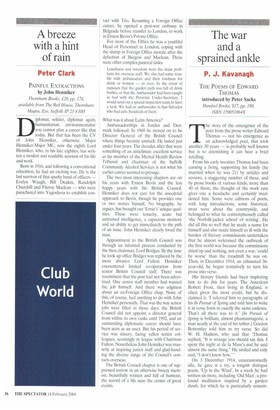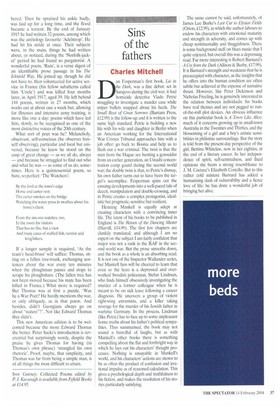The war and a sprained ankle
P. J. Kavanagh
THE POEMS OF EDWARD THOMAS introduced by Peter Sacks Handsel Books, $17, pp. 180, ISBN 159051064X The story of the emergence of the poet from the prose writer Edward Thomas — not his emergence as an acknowledged poet, that took another 30 years — is probably well known but is so astonishing it can bear a brief retelling.
From his early twenties Thomas had been earning a living, supporting his family (he married when he was 21) by articles and reviews, a staggering number of these, and by prose books of various kinds, more than 40 of them; the thought of the work rate gives one a headache and certainly maddened him. Some were editions of poets, with long introductions, some historical, most were about the countryside, and belonged to what he contemptuously called 'the Norfolk-jacket school of writing'. He did all this so well that he made a name for himself and also made himself so ill with the burden of literary commissions undertaken that he almost welcomed the outbreak of the first world war because the commissions dried up and nothing, not even a war, 'could be worse' than the treadmill he was on. Then, in December 1914, an exhausted 36year-old, he began tentatively to turn his prose into verse.
His literary friends had been imploring him to do this for years. The American Robert Frost, then living in England, is often given the most credit, but he disclaimed it. 'I referred him to paragraphs of his In Pursuit of Spring and told him to write it in verse form in exactly the same cadence. That's all there was to it.' (In Pursuit of Spring is brilliant, almost phantasmagoric, a man nearly at the end of his tether.) Gordon Bottomley told him to try verse. So did W. H. Hudson, who said that 'Thomas replied, "It is strange you should say this. I spent the night at de la Mare's and he said almost the same thing." He smiled and only said, "I don't know how." ' On 3 December 1914, unaccustomedly idle, he gave it a try, a longish dialogue poem, -Up in the Wind'. In a week he had written six more, including 'Old Man', a profound meditation inspired by a garden shrub, for which he is particularly remem
bered. Then he sprained his ankle badly, was laid up for a long time, and the flood became a torrent. By the end of January 1915 he had written 32 poems, among which was the anthology favourite 'Adelstrop'. He had hit his stride at once. Their subjects were, in the main, things he had written about, or noticed, during the 'Norfolk-jacket' period he had found so purgatorial. A wonderful poem, 'Rain', is a verse digest of an identifiable prose passage in his The kknield Way. He joined up, though he did not have to, then volunteered for active service in France (his fellow subalterns called him 'Uncle') and was killed four months later, in April 1917, aged 39. He left behind 144 poems, written in 27 months, which works out at about one a week but, allowing for illnesses and intensive army training, is more like one a day: poems which have led him, slowly, to be recognised as one of the most distinctive voices of the 20th centuty.
What sort of poet was he? Melancholy, observant, self-conscious (he observes himself observing), particular and local but universal, because he knew he stood on the cusp of great change — as we all do, always — and because he struggled to find out who and what he was — as some of us do, sometimes. Here is a quintessential poem, so bare, so perfect: 'The Watchers': By the ford at the town's edge Horse and carter rest: The carter smokes on the bridge
Watching the water press in swathes about his
horse's chest.
From the inn one watches, too, In the room for visitors That has no fire, but a view And many cases of stuffed fish, vermin and kingfishers.
If a longer sample is required, 'As the team's head-brass' will suffice: Thomas, sitting on a fallen tree-trunk, exchanging sentences about the war every ten minutes when the ploughman passes and stops to scrape his ploughshare. (The fallen tree has not been moved because his mate has been killed in France.) What more is required? But Thomas was at first a puzzle. 'Was he a War Poet? He hardly mentions the war, or only obliquely, as in that poem. And besides, didn't Georgians always go on about "nature"? '. Not like Edward Thomas they didn't.
This new American edition is to be welcomed because the more Edward Thomas the better. Peter Sacks's introduction is reverential but surprisingly wordy, despite the praise he gives Thomas for having (in Thomas's own phrase) 'strangled his own rhetoric'. Proof, maybe, that simplicity, and Thomas was far from being a simple man, is of all things the most difficult to attain.
Ivor Gurney: Collected Poems edited by P. 1 Kavanagh is available from Fyfield Books at £14.95.



































































 Previous page
Previous page